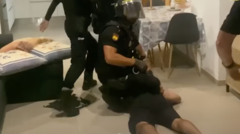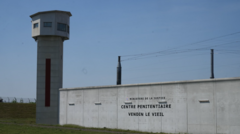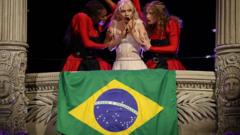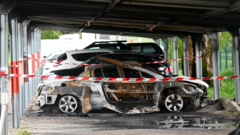As evangelical Christianity gains ground in Brazil, drug gangs like the Pure Third Command are capitalizing on religious themes, fostering a troubling alliance that fuels violence against other faiths in Rio's favelas.**
The Unholy Alliance: Drug Gangs and Religious Extremism in Rio's Favelas**
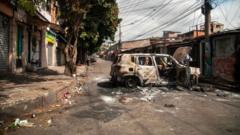
The Unholy Alliance: Drug Gangs and Religious Extremism in Rio's Favelas**
A look into how Rio de Janeiro's Pure Third Command gang intertwines Pentecostal beliefs with drug trafficking, leading to a rise in religious intolerance.**
Within the dangerous landscape of Rio de Janeiro, the intersection of faith and crime is becoming increasingly stark, with drug gangs adopting religious overtones to consolidate power and territory. The Pure Third Command, one of the city's most potent criminal factions, is notorious for its use of religious symbology, like the Star of David, on its illicit product packaging. This symbol, while not representative of Judaism, reflects the gang's belief rooted in a unique interpretation of Pentecostal Christianity, which emphasizes significant biblical prophecies relating to the Jewish people.
The conflict within these favelas is spiritual as much as it is physical. Territory now claimed by the Pure Third Command, named the Israel Complex, was purportedly divinely assigned to them after a vision from one of their leaders, as explained by theologian Vivian Costa. She notes that these gang members consider themselves "soldiers of crime," operating under the guise of divine mandate, seeking to expunge any opposing religious beliefs in their sphere of influence.
The plight of individuals caught in this conflict is exemplified by Pastor Diego Nascimento, once a member of a notorious gang, who after years of addiction witnessed a radical transformation after he embraced Christianity. However, he encounters a problematic paradox; while he preaches redemption, he is deeply aware of the falsehood of claiming to honor Christ while engaging in criminality. Nascimento now dedicates his life to helping other former criminals turn away from lives of crime but firmly rejects the notion that there can be any legitimate overlap between faith and drug trafficking.
The expansion of Pentecostalism has incited deep fears among followers of Afro-Brazilian religions, as growing violence by gangs has provoked cultural and religious persecution. Activists like Christina Vital highlight the reality faced by residents in gang-controlled areas, where practicing non-Christian religions can lead to verbal and even physical threats. Dr. Rita Salim, head of the police department tackling racial intolerance, asserts that the gangs' actions have intensified fear among these communities, often leading to the closure of legitimate religious sites.
The phenomenon is not isolated to the streets of Rio; reports indicate a nationwide trend where religious minorities face increasing hostilities. Marcio de Jagun, a babalorixá and religious diversity coordinator, frames this battle as a modern-day crusade rooted in both ethnic and religious biases. The infiltration of evangelical beliefs into the machinations of crime denotes a significant shift in Brazil’s social fabric, raising alarms about religious freedom which is constitutionally protected.
The emerging narrative of “Narco-Religiosity” – a term proposed by Costa to better encompass the historical blending of faith and criminality – reflects an unsettling reality for millions. As these gangs pose a threat to religious liberties already fragile in communities historically beset by violence, the need for action to safeguard these rights grows ever more urgent. Meanwhile, as Brazilian society grapples with this malignant blend of crime and faith, the cost to community cohesion and individual lives remains catastrophic.



